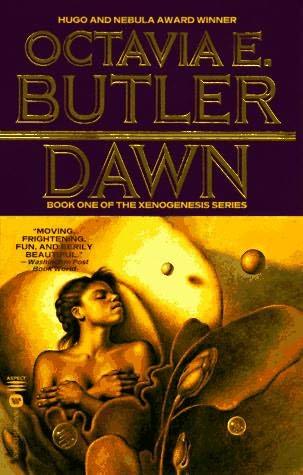Required Book:

In Diverse Position Science Fiction, the characters are pushed to the limit in a world that is no longer hospitable. Octavia E. Butler has done a marvelous job of creating a world in which humans struggle to survive as well as keep their humanity.
The main character, Lilith Iyapo, wakes up in a cell. She has no contact with the outside world, except for an inanimate voice that attempts to ask her questions. It is discovered that the Earth has been made unlivable through human warfare and that extraterrestrials have intervened. They have come to trade in genetic makeup. The alien race, Onkali, survives by taking what they see to be superior genes from other species. However, they also force their trading partners to receive some of their alien genes in return, thereby changing both species completely. This becomes the main conflict of the book, the struggle to keep human beings human.
Butler's Dawn is atypical of science fiction in that it does not center around a mechanically advanced society, galactic war, or human greatness. On the contrary, the Onkali are essentially biological. Their space ship is "alive." They avoid the use of mechanics. There is no mention of huge galactic empires fighting each other across galaxies. In fact, the Onkali talk about their "trading" process as if it is accepted and met with little conflict elsewhere in the universe. Human folly and weakness is emphasized more than human greatness. A small group of powerful humans were inconsiderate and callous enough to destroy the world. The Onkali actually thought that the humans must have discussed and decided to perform mass suicide of their species together, because any other reason for a species self-inflicted destruction did not make sense to them.The humans in Dawn are constantly portrayed as powerless against the Onkali and their "seduction". The only strength a human obtains is through Onkali genetic engineering and the creation of primitive weapons.
The novel is an exploration of a world very separate from our own. The author relies on social interaction between the Onkali and humans in order to describe the difference between the alien and human worlds. For example, the Onkali believe cancer has medicinal or curative properties and see it as a gift. The Onkali have a third gender called Ooloi. The Ooloi mate with a male and female Onkali and are instrumental to reproduction. This third distinction is extremely important to Onkali existence, but is foreign from human understanding. Once experienced, an encounter with an Ooloi can be dangerously strong. They can provide a mental connection that simulates or is better than sex. Interestingly, in a species that trades genetic codes for survival they do not see differences as negative. The fact that humans are equally full of life and death on a genetic level intrigues them and is seen as "beautiful possibility," erasing racial tension.
This is a niche book. Ignoring majority expectations, it creates its own momentum. Dawn illustrates that Science Fiction is becoming increasingly more diverse. There is a rise of authors similar to Octavia Butler, interested in world building and challenging accepted culture. The first installment of the Xenogenesis series leads the reader to wonder what the Onkali's human "trade" will lead to.
Required Movie:
Monsters (2010) director: Gareth Edwards

Monsters explores human nature. When the food chain is threatened humans become aggressive. The aliens in the movie are shown to be aggressive when they feel threatened, but seem otherwise unconcerned with humans.
When humans are scared, they become irrational. In order to survive, man must remain calm and observant of his surroundings.
During crisis the gap between differing social classes becomes larger. Those with means are insulated by their wealth. Those on the margins of society tend to take risky, desperate actions. However, when humans are dependent on each other for survival, they often become more compassionate. Impossible circumstances can push very unlikely people together.
When people are afraid they like to pretend they are invincible.
Catastrophe morbidly draws people like flies and sells papers.
Being heartless is much harder to do when actually faced with a grotesque situation or moral compromise.
When constantly faced with impending death, personal identity becomes clearer.
No matter how hard you try to push away your past it stays with you.
Temporary pleasure is just that, temporary.
No comments:
Post a Comment